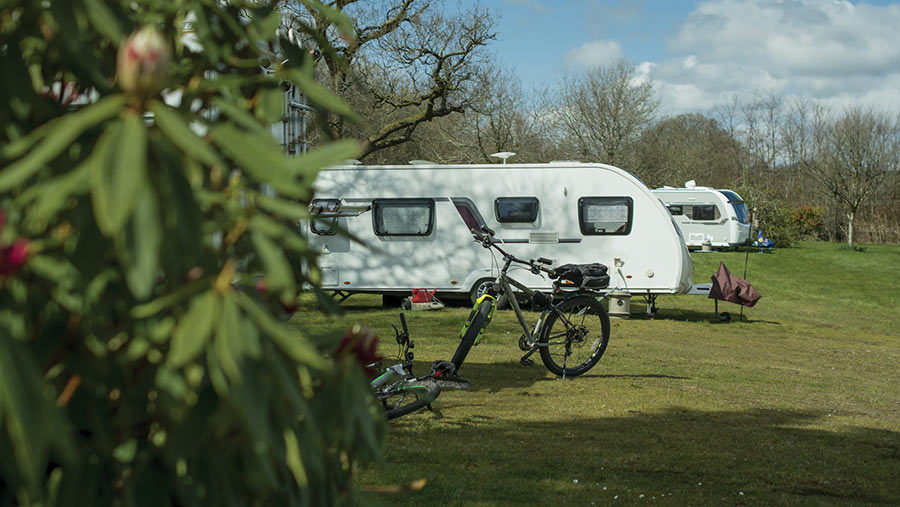Late bookings and high expectations in farm holiday market
 © iStockphoto/Jelena Mbugua
© iStockphoto/Jelena Mbugua Farm-based holiday accommodation providers are feeling the impact of policy changes, the weather and the cost-of-living crisis.
David Brown, a director with Farm Stay UK, which represents more than 400 farms with about 900 cottages, 200 glamping units and 200 farmhouse B&B rooms, says demand is down on the high levels seen during 2021-22, but remains more buoyant than before Covid.
The biggest change in recent months is that holidaymakers are tending to book shorter breaks and with less notice than they used to.
See also: Farm holiday providers need to stand out to succeed
There was a surge in those trying out rural holidays for the first time during the pandemic and many of them have decided they want to keep repeating the experience, he says.
“However, the booking process has definitely changed – across the industry we are noticing shorter lead times and a bit of a move towards shorter breaks, rather than full weeks.
“That might be because people are using UK holidays as their second holiday, but I think it is probably to do with the cost-of-living crisis.”
David, who offers holiday accommodation at Hoe Grange Farm in the Peak District, says that at the end of September 2023, bookings for the final three months of the year had been looking thin, but once they got into those months, the weeks filled.
What’s on holidaymakers’ wishlists?
According to analysis of search terms used on the Farm Stay UK website, the following facilities are of high importance to customers:
- Staying on a farm/feeding farm animals
- Accessible accommodation
- Hot tub
- Ability to bring a horse on holiday
- Swimming pool
- Dog-friendly – people want their dogs with them and also because of the high cost of kennel stays and other pet holiday cover
“The business was there but with week-to-week lead times, which does make it harder in terms of business planning and being able to commit to spending or improvements.”
This unpredictability – along with higher mortgage rates – is prompting quite a few who entered the sector during the Covid boom to sell up.
“A surprising number of properties which are in the honeypot villages have popped back up for sale again,” says David.
However, most farm-based holiday providers will be long-established businesses and committed to the long term, says David.
Camping
Dan Yates, founder and managing director of camping booking site Pitchup, says more than 700,000 nights have already been booked for 2024, which is on a par with the same point in 2023.
He agrees that booking patterns have changed to become “shorter, closer and later”.
“As the weather becomes more unpredictable, people are leaving it later and later to book, with the average time between booking and arrival just 34 days over the past year.”
However, he believes that outdoor accommodation will prove to be more recession-proof than other sectors of travel, and that it aligns with global trends in health and wellness and sustainable consumption.
Pitchup currently has 1,098 farm-based camping sites listed in the UK, compared with just 464 in November 2019.
A key factor in growth has been the extension of permitted development rights in England, which came into effect permanently in 2023 after being introduced during the pandemic.
This allows farms to operate a temporary campsite for up to 50 tents, motorhomes or campervans for up to 60 days each year.
Unfortunately, in Wales, where the rights have not been extended, the number of temporary campsites is in decline, says Dan.

© iStockphoto/Ana Lebiodiene
This is despite the potential opportunity being greater in Wales – 34% of holidays in Wales involve camping and caravanning, compared to just 20% in England.
Scotland and Northern Ireland are also yet to follow England’s lead.
Glamping
The number of glamping sites listed has continued to rise and accounts for about 20% of searches on the Pitchup website.
As a diversification opportunity, glamping units appeal to farmers as, in theory, they should be able to provide more of a year-round income that is less vulnerable to the weather.
Dan warns that customer expectations and competition can be high.
According to David, there was a big influx into glamping units during the pandemic and there are now areas of the country where the market for glamping is saturated, making it hard to maintain occupancy levels.
“That said, as always, quality will shine through and something that is slightly unusual and has a really good reputation online is still attracting the business.”
David also reports that a 25-30% rise in searches on the Farm Stay UK website points to a resurgence of interest in farm-based B&B accommodation.
Planning policy changes coming for holiday accommodation
The government has announced that it intends to change rules in England so that planning permission is required before a house can be used as holiday accommodation.
It is also proposing to introduce a new mandatory national register to give local authorities better information about short-term lets in their area.
David Brown of Farm Stay UK says the register should help to clamp down on less scrupulous owners who might not be meeting all the safety legislation, although it will be important that the requirements are not overly onerous on providers, or too costly.
“But this is the way to weed them out and to make sure that everywhere guests are staying is as safe and legal as the next place,” he says.
“Those of us who have been operating on a professional level for a number of years are already ticking the boxes.”
While the wider self-catering sector is opposed to the idea of a change in planning rules – which will involve creating a new planning “use class” for short-term lets – David says from the perspective of farm-based accommodation providers, there should be little impact.
The proposed change is largely in response to concerns about local people being forced out of the housing market by people buying existing homes to let out to holidaymakers – which they can currently do without planning permission.
However, most farmers who have diversified into holiday lets will have converted barns, new-build cabins, or glamping units, which will have required planning permission.
David says he is relieved that England is not going down the same route as Wales in introducing a minimum occupancy rate.
In April 2023, the Welsh government changed the criteria for a holiday let property, so that it has to be occupied for a minimum of 182 days to be eligible for business rates.
Properties that do not qualify for business rates must pay the second home premium rate of council tax, which local authorities have the discretion to set at 300% of the standard council tax rate.
This is a concern, as a survey carried out by a coalition of tourism organisations in October 2023 found that only 51% of accommodation providers had achieved the 182 days required in the year April 2022 to March 2023.
The Welsh government has also recently announced that it also has plans to introduce a statutory registration and licensing scheme for all visitor accommodation in Wales.
The first stage will be the registration scheme and, once that is fully established, the intention is to follow with the licensing scheme.
However, CLA Cymru is warning that a licensing scheme will add further financial and administrative burdens in a highly competitive business environment.
“Research undertaken with around 100 businesses during the consultation period last year told us how little scope exists to absorb additional costs,” says director Victoria Bond.
“Most Welsh rural holiday lets command a modest margin of between £5,000 and £10,000 from three or fewer units. More than half are farm diversifications.”
The licensing scheme, combined with the 182-day rule and a proposed visitor levy in Wales, amount to a triple-whammy for a sector that has barely recovered from Covid lockdowns, and which is highly vulnerable to the vagaries of the Welsh weather, says Victoria.
“Add a possible road user levy mooted by the Welsh government recently, and we can expect budget-conscious holidaymakers to turn their backs on Wales.”
Licensing in Scotland
A requirement for providers of holiday accommodation in Scotland to have a licence came into force on 1 October 2023.
The move was opposed by the Scottish rural tourism industry, which felt it was adding unnecessary red tape and cost on operators.
According to Scottish Agritourism, which represents rural tourism providers across Scotland, five months on from the introduction of licensing, many applicants for a short-term let (STL) licence have found the process frustrating and drawn out.
New businesses have been left waiting for a licence before they can start trading and there are big differences in terms of what local authorities are charging and asking for in terms of paperwork.
For example, the cost of a licence in Angus for six to 20 guests is £460, versus £1,600 in neighbouring Perth and Kinross for more than 11 guests.
Although none of the 270 members of Scottish Agritourism have chosen to close because of the new requirements, official agritourism numbers in Scotland dropped from 632 to 614 within three months of the new legislation coming into effect.
Scottish holiday accommodation providers also report that bookings are becoming more last-minute, but consumers are prepared to pay for the right experiences.
Booking numbers have levelled out now to be similar to those pre-Covid, but a lot more farmers have diversified to offer accommodation, says a spokesperson.
“As this number continues to grow, there is greater availability and diversity of agritourism offerings to meet the growth in demand.”
